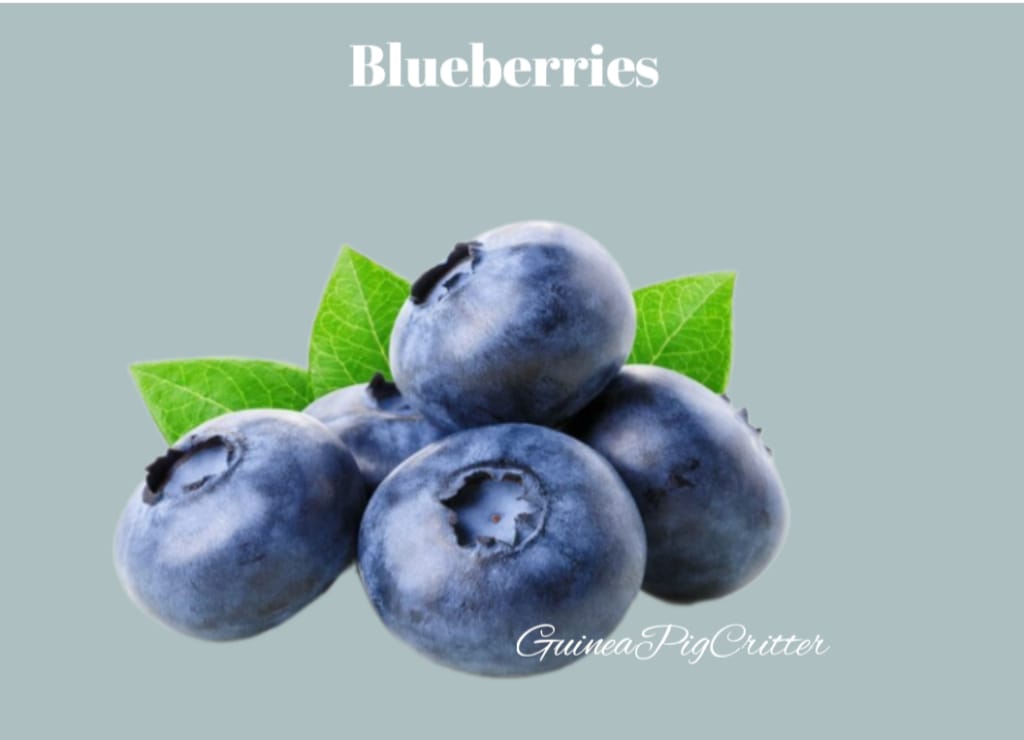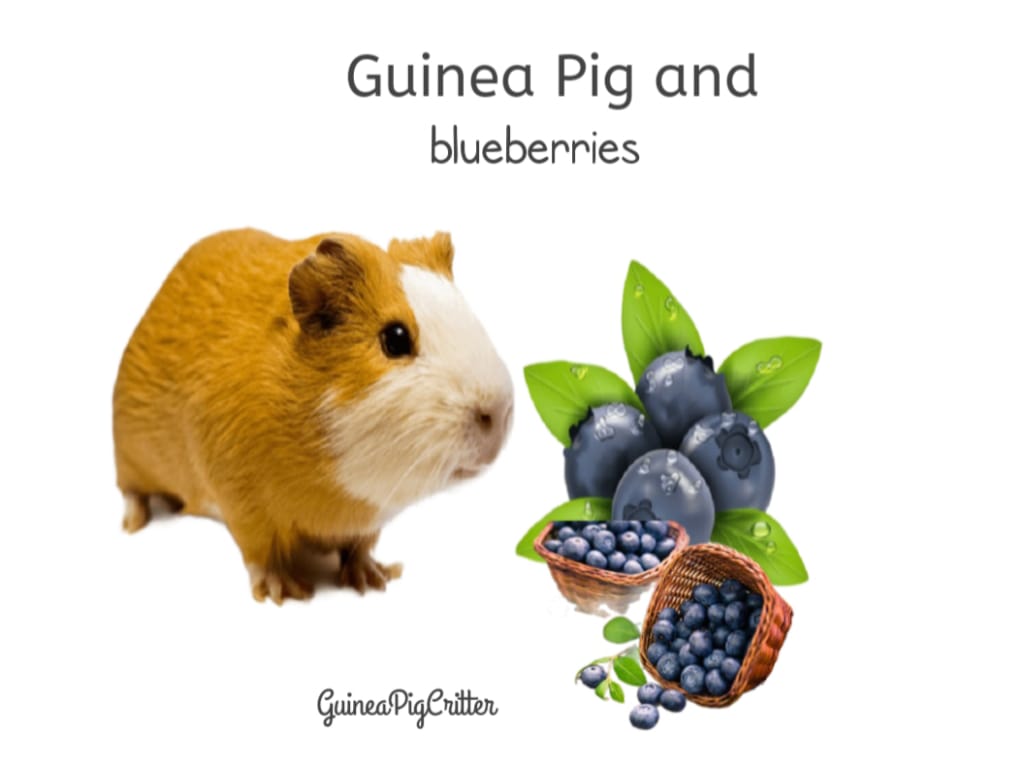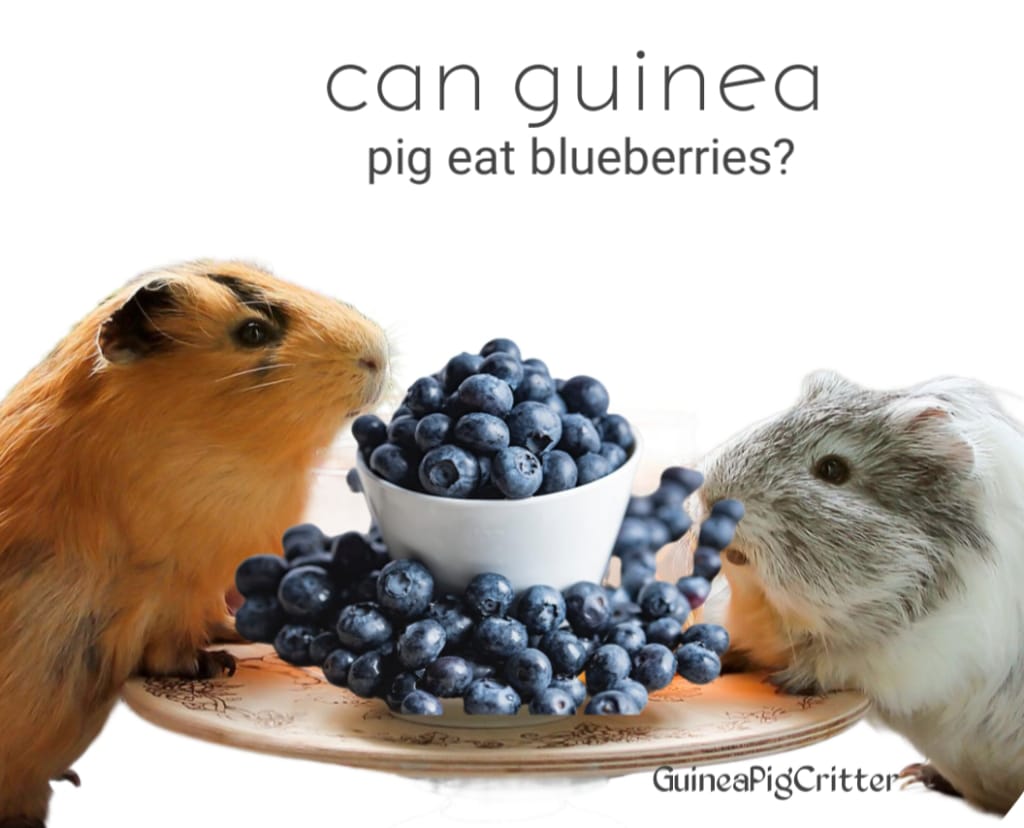Guinea pigs are interesting little pets that have been recognized for their cheerful natures and distinctive squeaks. They have unique dietary requirements that must be managed carefully in order to keep them healthy and happy. It is not uncommon for pet owners to wonder what fruits and vegetables their animals should or can eat.
So, Today’s Question is:-can guinea pig eat blueberries?
One of the fruits that often arise in conversation is a blueberry. These tiny superfoods are known by people to be sweet and healthy too, are they good for guinea pigs? In this complete guide, we will examine whether guinea pigs can be given blueberries as treats, look at their nutritional benefits, potential risks involved and offer some suggestions on how to incorporate them into your pet’s daily food.
Nutrients contained in Blueberries
Blueberries are often referred to as having an impressive nutrient profile. Let us examine what makes them an outstanding fruit:
Vitamins and Minerals
- Vitamin C: Guinea pigs depend on their diet to meet this essential nutrient as they can’t produce vitamin C like humans. Vitamin C is an immune supporter, collagen producing factor and it maintains overall health. Blueberries provide another source of vitamin C to guinea pigs although they get it from hay and vegetables which are the most common sources.
- Vitamin K: Guinea pigs also synthesize some amounts of vitamin K in their bodies apart from those dietary sources.
- Manganese: Manganese found in blueberries promotes bone health, metabolism, and acts as antioxidants.
Antioxidants
Blueberries have one of the highest antioxidant levels amongst fruits. Antioxidant such anthocyanins can be used by guinea pigs for better immunity and general health since they help in fighting oxidative stress and reducing inflammation.
Fiber
For a well-functioning digestive system, it is important to consume dietary fiber that are found in blueberries. Fiber can keep digestive tract regular and can also help avoid gastrointestinal ailments like constipation as well as encourage healthy gut flora. Including fibrous food in your guinea pig’s diet will promote digestion and general good health.
Can Guinea Pigs Eat Blueberries?
This is true that guinea pigs can eat blueberries, but there are some things you should bear in mind. Check out these points:
Is It Safe for Guinea Pigs to Eat Blueberries?
In moderation, blueberries are non-toxic to guinea pigs; therefore you can give them as treats without any fear. They are 100% natural fruits without any harmful chemicals or additives, which makes them much better than processed alternatives. Nevertheless, this does not mean that blueberries should be considered a primary component of your pet’s daily diet.

Are There Any Reasons Why Your Pet Should Eat Blueberries?
- Some reasons why your pet might benefit from eating the occasional serving of blueberry include:
- Supplemental Vitamin C: These provide an additional boost of vitamin C for immune support and overall health.
- Antioxidant Boost: Antioxidants from these berries can help reduce oxidative stress and enhance body wellness.
- Digestive Health: A good dose of fiber from blueberries helps digestion thereby preventing common GI issues.
Feeding Blueberries to Guinea Pigs
When you plan to introduce blueberries into the diet of your guinea pig, it is vital to do this right. Here are some tips on feeding blueberries:
Portions as Recommended
Guinea pigs are small animals and have a vulnerable stomach. Hence portion control is extremely important. Just give them 1-2 blueberries at a time. This small amount of food has all the advantages of blueberries without overwhelming their digestive system with too much sugar.
How Often to Offer Blueberries
Blueberries should be seen as a treat rather than part of regular diet for the piglets. As a general rule, you can give them blueberry once or twice in a week. This frequency lets your guinea pig enjoy fruit’s benefits while ensuring that its system does not get overloaded by sugars.
Preparation Points
Safe and pleasurable options rely heavily upon correct preparing of blueberries for your guinea pig:
- Thoroughly Wash: You should always wash blueberries thoroughly before giving them out to your guinea pig. This procedure helps remove any pesticides, chemicals, or dirt which could have harmful effects on it.
- Cut if Necessary: In case they are tiny or cannot eat whole berries easily, you may cut up the berries instead so that they can’t choke on them and they could still eat the treat safely enough.
Possible Risks & What to Consider
Even though blueberries are usually safe for guinea pigs, there are some things that can be dangerous.
High Sugar Content
Blueberries have natural sugars and these may not be good for guinea pigs when taken in large amounts. Excessive sugar intake may lead to obesity and dental issues among others. To reduce this risk it is important to serve small portions of blueberries less frequently.
Digestive Issues
New foods given to your guinea pig’s diet can sometimes result in digestive upset. Diarrhea or an upset stomach might happen if your guinea pig isn’t used to eating fruit. Start off with a little serving of blueberries and watch how your guinea pig reacts. In case of any adverse effects, stop giving the treat and call a veterinarian.
Allergies & Sensitivities
Very few but some guinea pigs might develop allergies or sensitivities towards certain foods including blueberries. So, if you see anything unusual about your pet’s behavior after eating berries – itching, swelling or change in conduct – refer it to a veterinary surgeon just to exclude allergy or sensitivity.
Substitutions for Blueberries
If you want other fruits which will help you diversify your pet’s nutrition then choose from the following:
Apples
Apple is a common choice and a good source of vitamin C. It is important to take off the seeds and core as well as it may be dangerous to guinea pigs. Minimize the apple cut.
Carrots
Such nutrients like fiber and vitamin A make carrots a healthy substitute to fruits. Crunchy and beneficial for teeth. Give manageable pieces of carrots.
Bell Peppers
Guinea pigs can safely eat bell peppers, which are rich in Vitamin C. They come in various colors such as red, yellow, and green hence providing additional nutrition and variety.
Strawberries
Also sustenance of guinea pigs, strawberries contain high amounts of vitamins C as well as antioxidants but should be given in moderation due to their natural sugar levels.

Frequently Asked Questions (FAQs)
Can Guinea Pigs Eat Blueberry Stems and Leaves?
No blueberry stems or leaves should be consumed by guinea pigs. These parts might not get digested properly leading to possible gastrointestinal problems. Only give them the fruit itself.
Guinea Pigs And Frozen Blueberries
The frozen fruits could be safe for guinea pigs as long as they are defrosted before being consumed. This can cause them to feel cold and thus uncomfortable if fed like that; therefore, it is better to warm them up a bit or let them acquire room temperature first.
Can Guinea Pig Eat Too Many Blueberries?
If you find your pet guinea pig eating too many blue berries, watch out for any signs of indigestion such as runny tummy or stomach ache. This should be done by reducing fruit intake in their diet while ensuring plenty of fresh hay and water are readily available. In case there is no improvement, or the condition worsens please consult a veterinary doctor.
Should I Include Blueberries In Daily Diet Plan?
Blueberries should not form part of a daily diet plan for your guinea pig. They are best served as an occasional treat to avoid excessive sugar intake. The main part of the diet should consist of hay, fresh vegetables and limited amount of good quality guinea pig pellets.
Conclusion
Concisely, blueberries can act as a good and nourishing treat for your guinea pig when given in small quantities. They have many antioxidants, fibers and high vitamin C which make them worthy of addition in the diet of your pet but it is important to balance them with other sources of food. Once you follow the recommended sizes and regularity, introducing blueberries to a diet can be risk-free and beneficial for your guinea pig.


